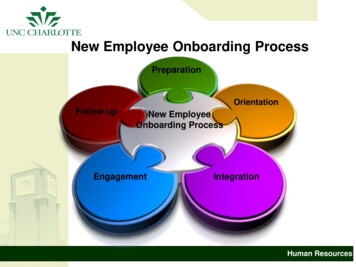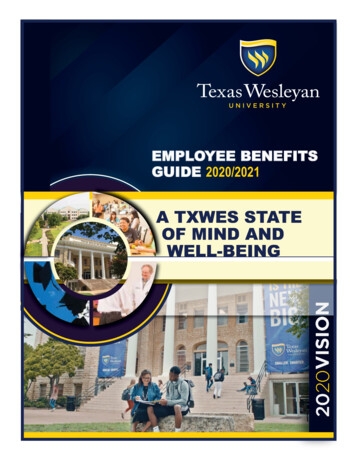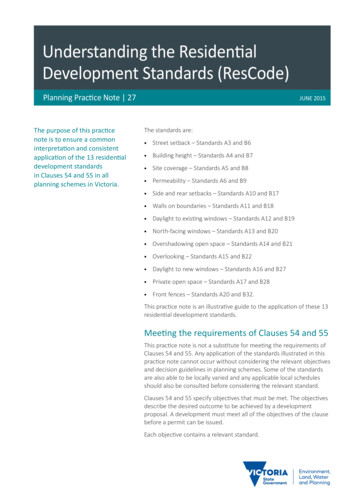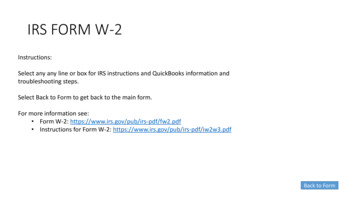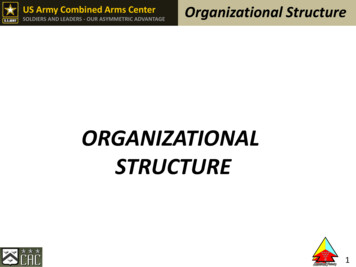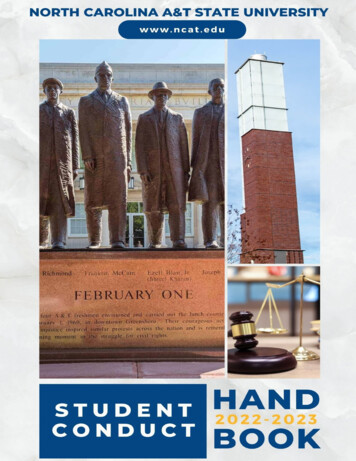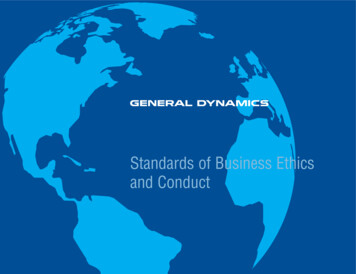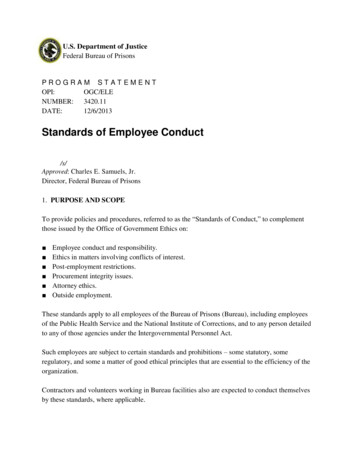
Transcription
U.S. Department of JusticeFederal Bureau of PrisonsPROGRAM STATEMENTOPI:OGC/ELENUMBER: 3420.11DATE:12/6/2013Standards of Employee Conduct/s/Approved: Charles E. Samuels, Jr.Director, Federal Bureau of Prisons1. PURPOSE AND SCOPETo provide policies and procedures, referred to as the “Standards of Conduct,” to complementthose issued by the Office of Government Ethics on: Employee conduct and responsibility.Ethics in matters involving conflicts of interest.Post-employment restrictions.Procurement integrity issues.Attorney ethics.Outside employment.These standards apply to all employees of the Bureau of Prisons (Bureau), including employeesof the Public Health Service and the National Institute of Corrections, and to any person detailedto any of those agencies under the Intergovernmental Personnel Act.Such employees are subject to certain standards and prohibitions – some statutory, someregulatory, and some a matter of good ethical principles that are essential to the efficiency of theorganization.Contractors and volunteers working in Bureau facilities also are expected to conduct themselvesby these standards, where applicable.
While issuances from the Office of Government Ethics and the Department of Justice address thebasic standards and prohibitions applicable to Bureau employees, this Program Statement morespecifically addresses situations that especially apply to Bureau employment. It cannot, however,attempt to detail every incident that could violate the Standards of Conduct.a. Summary of ChangesDirective RescindedP3420.09Standards of Employee Conduct (2/05/99)Changes in this issuance include: Specifying illegal drugs prohibited under Section 5, Personal Conduct. Eliminating the moving traffic violations reporting requirement under Section 7, IllegalActivities.Greater changes include those found under the Introduction of Contraband, GovernmentProperty, and Outside Employment sections.b. Program Objectives. The expected results of this program are: Employees will conduct themselves in a manner that fosters respect for the Bureau ofPrisons, the Department of Justice, and the U.S. Government. Employees will avoid situations that involve conflicts of interest with their employment. Employees will comply with restrictions on employment outside the Bureau and afteremployment with the Bureau. Employees will conform to procurement integrity regulations. Employees will uphold the ethical rules governing their professions. Employees will immediately report any violation, or apparent violation, of standards ofconduct to their Chief Executive Officer (CEO) or another appropriate authority. Employees who fail to conduct themselves in accordance with these standards will be subjectto appropriate sanctions.2. DEFINITIONSFor the purposes of this Program Statement, the following definitions apply:a. Chief Executive Officer (CEO). The Warden at institutions, the Director at staff trainingcenters, the Residential Reentry Manager at residential reentry field offices, the RegionalP3420.11 12/6/20132
Director at regional offices, and the Assistant Director of each division at the Central Office.The CEO ensures that staff are made aware of updates and revisions that affect employeeconduct.b. Conflict of Interest. A conflict of interest exists where responsibilities as a public servantaffect, or are affected by, the employee’s private interests.c. During the Conduct of a Procurement. The time between the beginning and end of aprocurement. The conduct of a procurement begins on the earliest date an authorized officialdirects that a specific action be taken to initiate a procurement. These actions include: Drafting a specification or a statement of work.Reviewing and approving a specification.Computing requirements or a purchase request.Preparing or issuing a solicitation.Evaluating bids or proposals.Selecting sources.Conducting negotiations.Reviewing and approving the award of a contract or contract modification.The conduct of a procurement ends with the award or modification of a contract or thecancellation of the procurement.d. Employment. Any form of employment or business relationship involving the provision ofpersonal services by the employee, whether undertaken at the same time as or subsequent tocurrent Federal employment. It includes, but is not limited to, personal services as an officer,director, employee, agent, attorney, consultant, contractor, general partner, or trustee.e. Former Inmate. An inmate for whom less than one year has elapsed since his/her releasefrom Bureau custody or supervision of a Federal court (see definition of “inmate” in Section2.g.), whichever is later.f. Illegal Drugs. Controlled substances acquired in violation of Federal law.g. Inmate. Persons in the custody of the Federal Bureau of Prisons or Bureau contract facilities,including persons charged with or convicted of offenses against the United States, D.C. Codefelony offenders, and persons held as witnesses, detainees, or otherwise.P3420.11 12/6/20133
h. Law Enforcement Agency. Any local, state, or Federal entity established to carry out andenforce the criminal law.I. Negotiations. Discussion or communication with another person, or a person’s agent orintermediary, mutually conducted with a view toward reaching an agreement regarding possibleemployment with that person.j. Official Investigation. Includes, but is not limited to, investigations conducted by the FederalBureau of Investigation, Office of the Inspector General, Office of Professional Responsibility,Office of Internal Affairs, Office of Personnel Management, Special Investigative Agent, SpecialInvestigative Supervisor, Equal Employment Opportunity Investigator, or any other officialinvestigation authorized by the CEO.k. Participate. To take action as an employee through decision, approval, disapproval,recommendation, rendering of advice, or investigation (applies to Sections 14 through 19 of thisProgram Statement).l. Particular Matter. Matters that involve deliberation, decision, or action that is focused uponthe interests of specific persons, or a discrete and identifiable class of persons. The particularmatters covered by this subpart include a judicial or other proceeding, application, request for aruling or other determination, contract, claim, controversy, charge, accusation, or arrest.m. Procurement Official. Any officer or employee of an agency who has participatedpersonally and substantially in any activities involved “during the conduct of a procurement.”This definition extends to contractors, subcontractors, consultants, experts, and advisors actingon behalf of, or providing advice to, an agency with respect to procurement (see Section 2.c.).3. PUBLICATION AND INTERPRETATIONThe CEO of each facility has the primary responsibility for ensuring that the Standards ofEmployee Conduct are provided and made known to each employee, contractor, and volunteer.The CEO must ensure that staff are made aware of updates and revisions that affect employeeconduct and receive annual training on their responsibilities under this policy.Per 5 CFR §2635.107, only actions made in reliance upon advice concerning ethical issues,received from the Ethics Office, will be protected from disciplinary action. No other authoritymay provide the employee this protection.P3420.11 12/6/20134
Where the employee’s conduct violates a criminal statute, reliance on the advice of an ethicsofficial cannot ensure he/she will not be prosecuted.Each new employee, contractor, and volunteer must receive and sign for this Program Statementat the time of appointment.Employees, contractors, and volunteers receive and sign for updated versions of this ProgramStatement when issued. The form Acknowledgement of Receipt of Standards of EmployeeConduct (BP-A0165) is filed on the left side of the Official Personnel Folder.Employee Development Managers, Volunteer Coordinators, or other designated staff ensure thatsupervisors and employees receive annual training on their responsibilities under this policy.4. GENERAL POLICYBureau employees are governed by regulations in 5 CFR Part 2635. While this ProgramStatement clarifies the applications of those regulations in the Bureau, it does not and cannotspecify every incident that would violate the Standards of Conduct.In general, the Bureau expects its employees to conduct themselves in such a manner that theiractivities both on and off duty do not discredit the agency. Employees must: Conduct themselves in a manner that fosters respect for the Bureau of Prisons, theDepartment of Justice, and the U.S. Government. Only arrest in their official capacity as permitted by 18 U.S.C. § 3050 and other relevantprovisions of the United States Code, the Program Statements Searching, Detaining, orArresting Visitors to Bureau Grounds and Facilities and Staff Entrance and SearchProcedures, or other authority officially granted to them. Endeavor to avoid any actions creating the appearance that they are violating the law or theethical standards promulgated in this policy and the statutes. Avoid conflicts of interest in matters that affect their financial interests. Comply with post-employment restrictions. Conform to procurement integrity regulations. Uphold the ethical rules governing their professions, including complying with applicablelicensing authority rules, except when they conflict with Federal law. Follow special rules to avoid conflicts of interest when seeking employment outside theBureau. As soon as practicable (but no later than 24 hours) report to their CEO (or other appropriateauthority such as the Office of Internal Affairs or the Office of the Inspector General) anyP3420.11 12/6/20135
violation, appearance of a violation, or attempted violation of these Standards or of any law,rule, or regulation.Every employee is required to immediately report to management any act or omission by anyperson that could result in a breach of institution security.Failure by employees to follow these regulations and policy or any other Bureau policy orrelevant regulation(s) could result in disciplinary action, up to and including removal (seeAttachment A).5. PERSONAL CONDUCTEmployees are expected to conduct themselves in a manner that contributes to the orderlyrunning of Bureau facilities. Some types of behavior cannot be tolerated in the Bureau:a. Alcohol/Illegal Drugs. The use of illegal drugs or the abuse of any drug, includingprescription-controlled substances, is strictly prohibited. Illegal drugs include, but are not limitedto: Marijuana.Cocaine.Ecstasy.Heroin.Amphetamines (“speed” or “crank”).Lysergic Acid Diethylamide (LSD).Use of alcoholic beverages or being under the influence of alcohol while on duty or immediatelybefore reporting for duty are prohibited. Employees are subject to disciplinary action if found topossess a .02 or greater blood alcohol content while on duty.b. Sexual Relationships/Contact With Inmates. Employees may not allow themselves toshow partiality toward, or become emotionally, physically, sexually, or financially involved withinmates, former inmates, or persons known (or who should have been known based oncircumstances) to the employee as a family member or close friend of inmates or former inmates.Chaplains, psychologists, and psychiatrists may continue a previously established therapeuticrelationship with a former inmate in accordance with their codes of professional conduct andresponsibility.P3420.11 12/6/20136
Bureau staff may not serve as program volunteers in religious services and educational programs.Under no circumstances are staff volunteers authorized to participate in inmate programs on aregular or occasional basis.An employee may not engage in, or allow another person to engage in, sexual behavior with aninmate. There is never any such thing as consensual sex between staff and inmates.Title 18, U.S. Code Chapter 109A provides penalties of up to life imprisonment for sexual abuseof inmates where the force is used or threatened. Sexual contact is defined as the intentionaltouching of the genitalia, anus, groin, breast, inner thigh, or buttocks with the intent to abuse,humiliate, harass, degrade, arouse, or gratify the sexual desire of any person.Penetration is not required to support a conviction for sexual contact. All allegations of sexualabuse will be thoroughly investigated and, when appropriate, referred to authorities forprosecution.Employees are subject to administrative action, up to and including removal, for anyinappropriate contact, sexual behavior, or relationship with inmates, regardless of whether suchcontact constitutes a prosecutable crime. Physical contact is not required to subject an employeeto sanctions for misconduct of a sexual nature.c. Additional Conduct Issues. An employee may not offer or give to an inmate or a formerinmate or any member of his/her family, or to any person known to be associated with an inmateor former inmate, any article, favor, or service that is not authorized in the performance of theemployee’s duties.Neither shall an employee accept any gift, personal service, or favor from an inmate or formerinmate, or from anyone known to be associated with or related to an inmate or former inmate.This prohibition includes becoming involved with families or associates of inmates.An employee may not show favoritism or give preferential treatment to one inmate, or a group ofinmates, over another.Consistent with policies and regulations: An employee may not use brutality, physical violence, or intimidation toward inmates, or useany force beyond what is reasonably necessary to subdue an inmate.P3420.11 12/6/20137
An employee may not use physical violence, threats, or intimidation toward any personvisiting a Bureau work site or toward fellow employees.In their official capacity, employees may not use profane, obscene, or abusive language whencommunicating with inmates, fellow employees, or others. Employees shall conduct themselvesin a manner that will not be demeaning to inmates, fellow employees, or others. The aboverequirements also apply to situations where there is a nexus between the employee’s conduct andhis/her position.An employee who becomes involved in circumstances as described in this section, Section 9 (orany situation that might give the appearance of improper involvement with inmates or formerinmates or their families, including employees whose relatives are inmates or former inmates)must report the contact in writing to the CEO as soon as practicable. (This includes, but is notlimited to, telephone calls or written communications with such persons outside the normal scopeof employment.) The employee will then be instructed as to the appropriate course of action.Exempted program officials must obtain prior approval to communicate with former inmates,their family members, or associates. All communications must occur from an institutionsetting.Employees must avoid situations that give rise to a conflict of interest or the appearance of aconflict of interest (see Section 2, Definitions).Employees shall not participate in conduct that would lead a reasonable person to question theirimpartiality.6. RESPONSIVENESSInattention to duty in a correctional environment can result in escapes, assaults, and otherincidents. Employees are required to remain fully alert and attentive during duty hours.Because failure to respond to an emergency may jeopardize the security of the institution, as wellas the lives of staff or inmates, it is mandatory that employees respond immediately, effectively,and appropriately during all emergency situations.Employees are to obey the orders of their superiors at all times. In an emergency situation,carrying out the orders of those in command is imperative to ensure the security of the institution.P3420.11 12/6/20138
7. ILLEGAL ACTIVITIESIllegal activities on the part of any employee, in addition to being unlawful, reflect on theintegrity of the Bureau and betray the trust and confidence placed in it by the public.It is expected that employees obey not only the letter of the law, but also the spirit of the lawwhile engaged in personal or official activities.Should an employee be charged with, arrested for, or convicted of any felony or misdemeanor,that employee must immediately inform and provide a written report to the CEO.8. INTRODUCTION OF CONTRABANDPer 28 CFR § 500.1(h), contraband is defined as “material prohibited by law, or by regulation, ormaterial which can reasonably be expected to cause physical injury or adversely affect thesecurity, safety, or good order of the institution.”Introducing or attempting to introduce contraband into or upon the grounds of any Federalcorrectional institution, or taking or attempting to take contraband out of it, without the CEO’sknowledge and consent, is prohibited.Staff may bring personal items into or upon the grounds of an institution, unless otherwiseprohibited by the Warden. Such items must remain in the possession of the employee, and /or besecured away from inmates, and disposed of properly when no longer needed. Consult theProgram Statement Staff Entrance and Search Procedures for additional requirements.9. OFFICIAL INVESTIGATIONIt is not the policy of the Bureau to routinely search employees or their property; however, theBureau retains the right to conduct searches of employees when such a search is believednecessary to ensure institution security and good order. Searches are conducted in accordancewith the Program Statement Staff Entrance and Search Procedures. Representation will beafforded to staff in accordance with the Master Agreement and Title 5.During the course of an official investigation, employees are to cooperate fully by providing allpertinent information they may have. Full cooperation requires truthfully responding toquestions and providing a signed affidavit if requested. Any employee who fails to cooperatefully or who hinders an investigation is subject to disciplinary action, up to and includingremoval.P3420.11 12/6/20139
In official investigations conducted by the Bureau of Prisons, an employee will be provided acopy of his/her signed affidavit upon request, absent rare or exigent circumstances. If thisoccurs, staff will be given the opportunity to review prior affidavits before giving anotheraffidavit.Employees must respond truthfully and in a timely manner to requests for information related totheir background security investigation. Failure to do so may result in disciplinary action up toand including removal. Form BP-A0194, Warning and Assurance to Employee Required toProvide Information, will be provided upon request to the employee who is the subject of theinvestigation.10. JUST DEBTSFailure on the part of any employee, without good reason and in a timely manner, to honor debtsacknowledged by him/her to be valid or reduced to judgment by a court, or to adhere tosatisfactory arrangements for the settlement of the debts, may be cause for disciplinary action.Depending on the circumstances, an employee who receives a legally valid garnishment ordermay be subject to disciplinary action.11. CONFIDENTIALITYEmployees of the Bureau have access to official information ranging from personal dataconcerning staff and inmates to information involving security. Because of the varying degreesof sensitivity, such information may be disclosed or released only as required in the performanceof an employee’s duties or upon specific authorization from someone who has the authority torelease official information. The only persons so authorized are: In the Central Office, the Director or designee. In a Regional Office, the Regional Director or designee. In other locations, the CEO or designee.The above shall not be construed as a reason to deny authorized persons access to official recordsand files. The Bureau has an obligation to supply official information in response to requestsfrom organizations or individuals who have been properly identified and are acting in an officialcapacity.To ensure the proper use of official information, the following rules of conduct are established:P3420.11 12/6/201310
Employees must verify the identification and authority of individuals requesting access toinformation before giving or discussing records, personnel files, or other official information. Employees may not deny authorized persons access to official information. Employees may not use, or release for use, official information for private purposes unlessthat information is available to the general public. Employees may not remove information from files or make copies of records or documents,except in accordance with established procedures or upon proper authorization. Employees may not make statements or release official information that could breach thesecurity of the institution or endanger any person. Employees must guard against providing or disclosing official information to persons withouta valid need to know. Former employees may be granted access only to information available to the general publicand have no greater standing than the general public, irrespective of their past employmentand any associations developed during it.12. GOVERNMENT PROPERTYGovernment property is to be used for authorized purposes only. Authorized purposes includepersonal use of Government office equipment such as computers, printers, fax machines,telephones, copiers, calculators, and Government-issued cellular phones, provided there is only anegligible cost to the Government.Personal use of office equipment may take place before or after official working hours or duringnon-paid meal breaks.Negligible costs are those which have no adverse impact to the Government and include, but arenot limited to, the cost of electricity, ink, and ordinary wear and tear. Employees must providetheir own paper.Personal use of office equipment will not take place during official working hours, with thefollowing exceptions:a. Office and Cellular Telephones. Employees may place a personal call on a Governmenttelephone during official working hours if the call: Does not adversely affect the performance of official duties by the employee or the Bureau. Is of reasonable duration and frequency. Could not reasonably have been made at another time.P3420.11 12/6/201311
Is within the employee’s local commuting area (not applicable to cellular telephones).b. Fitness Equipment. Employees may use Government-owned fitness equipment duringbreaks if such equipment is intended exclusively for employee use.This policy does not prevent the establishment of additional rules or restrictions, for businessreasons, on the use of Government property.13. CREDENTIALSBureau identification cards or credentials may always be used by staff to verify Bureauemployment to any entity.Employees may not obtain or use identification cards or badges from sources other than theBureau that give the appearance of being an official Bureau credential or badge.Employees may never use Agency-issued identification cards or credentials to represent that it isa Bureau requirement to carry a personal firearm on or off duty.Employees may use credentials to prove Government employment for purposes of permissiblediscounts offered to a broad class of Government employees.14. OUTSIDE EMPLOYMENTa. Definitions (for purposes of this section)(1) Criminal Matters. Involvement with Federal, state, or local law enforcement agencies,matters carried out under 18 U.S.C., involvement with Federal, state, or local inmates.(2) Outside Employment. Any form of employment, business relationship, or activityinvolving the provision of personal services, whether or not for compensation, other than whendischarging official duties.It includes, but is not limited to, services as a lawyer, officer, director, trustee, employee, agentconsultant, contractor, or general partner (see 5 C.F.R. § 3801.106). Employment may alsoinclude speaking, writing, and teaching (see 5 C.F.R. § 2635.807).b. General Limitations. An employee may not engage in outside employment, as definedabove, that conflicts with his/her official duties. In addition, employees may not engage in:P3420.11 12/6/201312
Any outside employment or activity that involves criminal matters or habeas corpus matters,be it Federal, state, or local. The practice of law, unless it is uncompensated and in the nature of community service, orunless it is on behalf of the employee or his/her parents, spouse, or children. Litigation, investigations, grants, or other matters in which the Department of Justice is orrepresents a party, witness, litigant, investigator, or grant-maker (see 5 C.F.R. § 3801.106).c. Approval.(1) Prior Approval. An employee must obtain written approval before engaging in outsideemployment (as defined above) which involves: The practice of law (see Section 15, Rules for Attorneys). A subject matter, policy, or program that is in the Bureau’s area of responsibility (see 5C.F.R. § 3801.106(c)).This includes, but is not limited to, architects, attorneys, chaplains, physicians, psychologists,security guard positions that are armed or have police powers, work in a law enforcementenvironment (firearms instructors, translators, administrative positions, etc.), court-appointedadvocates, private investigators, judgement recovery, and auxiliary law enforcement, to includestate militia, sheriffs, search and rescue, and fish and game wardens.(2) Notification. All other employees engaging in outside employment in accordance with thissection must provide written notification to the CEO, using the appropriate form (see Section14.c.(5)), within 30 days from the date outside employment begins. The CEO will indicatereceipt of notification and may provide any comments to the employee.(3) Exceptions. Employees who perform voluntary service, involving religious activity,employee’s club, credit union, or union activities, which do not conflict with their official dutiesor with the Bureau’s mission, are exempt from the requirement to request approval for theseactivities.(4) Other Requirements. Any approval granted for outside employment or activity applies only to the particularposition or activity referenced in the application and approval. Any employee whose outside employment status changes due to accepting a differentposition with the same company, beginning work for a different company, a change of BOPP3420.11 12/6/201313
duty station, etc., must submit a new request form, and receive approval for the outsideemployment per Section 14.c.(1) or c.(2), above. Any employee who wishes to serve as an officer or director of any organization, whethercompensated or uncompensated, must complete an outside employment request form.Certain high-level officials who wish to serve as an officer or director of an organizationmust submit the request through the Director to the Deputy Attorney General.(5) Forms. Employees seeking outside employment within their profession must completeForm BP-A0543, Request for Approval for Outside Employment Within One’s Profession. Thismust be completed with all signatures before the employee may engage in the outside practice ofhis/her profession.Employees seeking all other types of outside employment must complete Form BP-A0166,Request for Approval for Outside Employment, or BP-A0927, Notification of OutsideEmployment.The employee is responsible for supplying all relevant information required on the forms.Failing to do this could result in processing delays or a denial of the request.(6) Waiver. Employees whose request for approval has been denied in accordance with theGeneral Limitations in Section 14.b. may request a waiver per 5 CFR 3801.106(b)(2).d. Outside Employment Within One’s Profession. Employees serving in the professionslisted below and wishing to engage in outside employment within that profession must have theapproval of their immediate supervisor, CEO, Regional Director, and the Director: .Attorneys who seek to practice law outside the Bureau must also refer to Section 15, Rules forAttorneys.Note: For the purpose of this subsection, teaching, writing, and speaking are not consideredpracticing within one’s profession.P3420.11 12/6/201314
e. Expert Witness. An employee may not serve, other than on behalf of the United States, as anexpert witness (with or without compensation) in any proceeding before a court or agency of theUnited States in which the United States is a party unless his/her participation is authorized bythe Bureau. Authorization may be provided by the Bureau Ethics Officer, per 5 C.F.R. §2635.805(c).f. Other Government Employment. With limited exceptions, Bureau employees may not beemployed by or contract for employment with any other Federal or law enforcement agencywhile employed by the Bureau. This prohibition does not apply to Federal military service,including reserve duty and National Guard service.g. Guidance. Employees should contact the Ethics Office for guidance concerning outsideemployment.15. RULES FOR ATTORNEYSa. Approval of Exceptions. Attorneys for the Bureau may not practice law for compensation onbehalf of any other person or entity without the written approval of the Deputy Attorney General.However, Bureau attorneys may perform uncompensated legal practice outside the Bureau if: The work does not violate 18 U.S.C. §§ 203 and 205. The General Counsel has approved the request. The work does not involve criminal matters.b. Confidentiality. Only under limited circumstances does the attorney/client privilege ofconfidentiality apply to communications with a Bureau employee.c. Successive Government and Private Employment. A former Bureau attorney may notrepresent a private client in connection with a matter in which the attorney participatedpersonally and substantially as a public offic
Bureau of Investigation, Office of the Inspector General, Office of Professional Responsibility, Office of Internal Affairs, Office of Personnel Management, Special Investigative Agent, Special Investigative Supervisor, Equal Employment Opportunity Investigator, or any other official investigation authorized by the CEO. k. Participate. To take .

